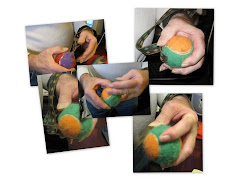What are we learning about glutamate and Parkinson's disease?
 |
| There's good news |
For years we've been asking restaurants to omit the MSG because we get funky headaches later after eating foods containing this excitotoxin. We'v been reading food labels to avoid monosodium glutamate. We were already working on an article about glutamate and the role this protein building amino acid and neurotransmitter plays in Parkinson's disease. We learned a little about the good, the bad and the ugly in the process.
We know that glutamate is a rapid, excitatory transmitter and that it can be associated to a vulnerability to addiction, so perhaps you could call it the smoker's nemesis. We also know that glutamate receptors are necessary for proper central nervous system functioning, for important cognitive function including memory formation and learning.
This week everyone is talking about glutamate and GRIN2A because of the news from the
World Parkinson's Congress currently being held in Glasgow, Scotland.
 |
| The coffee cups are waiting |
It has been learned that GRIN2A, is the "coffee" gene which when combined with caffeine intake appears not only to be neuroprotective for PD in a certain percentage of the population but may also affect PD clinical trial results when some study participants may have the altered GRIN2A gene. This in turn raises the question of whether it can also influence medications used to treat Parkinson's disease symptoms.
Those people protected by the caffeine gene are carriers of a specific variation of GRIN2A according to information discussed at the World Parkinson's Congress. At this time the focus is on a limited population.
We already know from the long
Hawaii coffee study that people who had regular caffeine intake were (48%-84%) less likely to develop Parkinson's disease. It would be more than interesting to know how many members of this study also had the special GRIN2A gene version. But that was then and we didn't have the same technology or gene bank.
GRIN2A is a glutamate NMDA subunit receptor in a class of
ionotropic glutamate gated ion channels, permeable to calcium. There has already been research about Bipolar disorder, ADHD and
Huntington's disease as well as
Parkinson's disease in connection to a hypoglutaminergic condition being involved in the pathogenesis. And certainly the negative role of glutamate in Parkinson's development is not unknown.
Researchers have been looking at the GRINB2 subunits for many years and their connection to PD in the forms of selective antagonists which can exacerbate levodopa-induced dyskinesia in animal models. In
other animal studies it was discovered that loss of striatal dopamine led to an increased stimulation of NR2B aka GRIN2B which contains NMDA receptors.
Basically glutamate becomes a link in the nitric oxide chain. Under certain conditions glutamate can break through the outer cell membrane via the NMDA (n-methyl-d-asparatate) receptors located on the neurons. This creates a
breach through which calcium can enter the cell. We already know that calcium is implicated in the death of dopamine neurons. If this chain can be interrupted...
To read more about the 2010 World Parkinson's Congress and to see folksy photos, check out
Talk Parkinson's.














Great Blog. I was just reading an article about wii balance board and PD. So basically a treatment could include coffee and video games.
ReplyDeleteLooks like we are moving forward with practical suggestions instead of adding too many medications too early.
Bravo Golf Doctor,
ReplyDeleteYou've hit on it!
Fun, smiling, laughter are miraculous necessities not to be ignored.
PD happens, it should not be a punishment.
Play the games, dance the dances.
As it has been said, we need to get busy living...
Hi, PD diagnosed 2008. Want to know more about glutamate. It's hard to get a definite feel for what they are hypothesizing. Seems like they are implying that excess glutamate (meats, wheat MSG) can allow calcium to penetrate nerve receptors? Is there a simpler explanation and natural therapy?
ReplyDeleteIt is theorized that excess calcium might be responsible for the premature summoning of dopamine from the nucleus (inner part of the dopamine neuron) to the cytoplasm where it meets the mutated alpha synuclein and rather than sending a message, creates a gummy mess which subsequently prevents recycling but rather causes the cell to die. Does the excess calcium create a phoney/misleading action potential?
ReplyDeleteSimpler?
You're on your computer, quietly reading your email. Suddenly you have a bunch of email that you think you'd better check. You open one which looks legit and click the link and suddenly you've got a virus or a worm or something bad. And not only does your email crash, your computer locks up or slows down or does something which affects its operation.
And you realize that you needed a better spam blocking program.
The suggestion about glutamate, although important for brain function, is that sometimes less is more when there are other defects such as defective alpha synuclein.
The first natural therapy now that the horse has been stolen is to reduce glutamate from your diet. One step might be to eliminate acetaminophen from your medicine cabinet and substitute a low dose aspirin if you have to have something.
Although there are people who swear by GSH (glutathione) injections, there are others who say they've seen no results or that the results didn't justify the cost. Just swallowing glutathione will not do it beccause too little leaves the intestinal tract.
You can read more here in an ALS diet page,
"The Relationships of Glutamine, Glutamate and Glutathione"
http://www.stemcelltherapies.org/ALS/glutamine-glutamate-glutathione.html
There is no easy, workable, natural therapy at this time unless you already have the right genes. But it is one research direction.